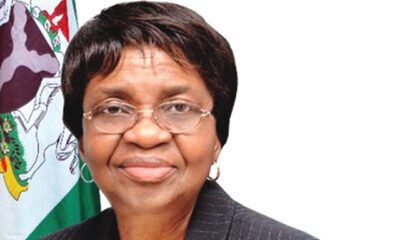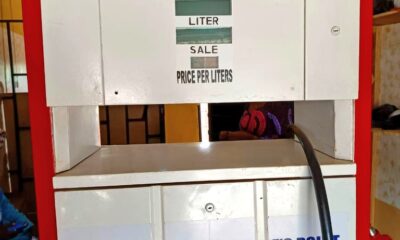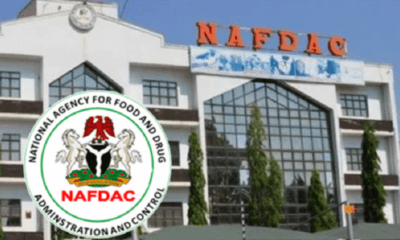Health
NAFDAC, pharmaceutical manufacturers, and importers of pharmaceutical products, agree to collaborate to achieve WHO ML4
…Begin local production of API vaccines
Major players in the nation’s pharmaceutical industry under the aegis of Pharmaceutical Manufacturers Group- Manufacturers Association of Nigeria (PMG-MAN) have pledged to collaborate with the National Agency for Food and Drug Administration and Control NAFDAC in its renewed efforts to attain the World Health Organization WHO Maturity Level 4 status and launch Nigeria into the league of Vaccines and Active Pharmaceutical Ingredients (APIs) producers in the world.
The manufacturers, led by the Chairman of PMG-MAN, Dr Fidelis Ayebae, commended the Agency on the achievement of WHO Maturity Level 3, stressing that the group would do everything humanly possible to support NAFDAC to continue to excel in creating an enabling environment for the industry to thrive.
‘’Let me assure you ma, that if there is one body in foods and drugs and other related chemicals which are under your purview, that want you to succeed more than anything else, that you can call success, it is PMG-MAN, he said.
Dr Ayebae who is also the Managing Director/ Chief Executive Officer, of Fidson Healthcare Plc, vowed to galvanize other chief executive officers of pharmaceutical companies in the country to ensure that they have a collaborative relationship with the regulatory body to make its oversight
responsibility over the industry most effective and help the industry to grow. He added that his body would form a technical committee with NAFDAC that would work with the Agency to ensure that the industry attains greater heights.
The Director General of NAFDAC, Prof Mojisola Adeyeye, at a hybrid stakeholders meeting organized by the Agency in Lagos on Pharmaceutical Traceability disclosed that the nation has to maintain the Maturity Level 3 attained last year by continuing to adhere strictly to the Best Global Practices in regulatory responsibility.
‘’We are going to strengthen our operations and be more effective. We are going to get ML4. We are going to get marked for World Listed Authority apart from ML4.’’, she said.
Prof Adeyeye, in a statement signed by the Resident Media Consultant of NAFDAC, Sayo Akintola, said that the Agency just met all the requirement of ML3, stressing that ‘’while doing that we got some requirements also satisfied under ML4, but not all. Which means our journey is not going to be as difficult as it was for the last four plus years’’.
She emphasized the importance of WHO ML4 which according to her would further boost the trade aspect of the Nigeria’s pharmaceutical industry without diminishing its health implications for the Nigerian populace.
The NAFDAC boss said Nigerians would be more confident of the medicines that they take since the process embarked upon by the Agency is aimed at mitigating against substandard and falsified medicines to a very low prevalence.
She disclosed that it took Ghana 13 years to get ML3 while it took Nigeria four years to attain the prestigious status, adding that achieving ML4 will really help the country’s manufacturing industry to grow. ‘’It will also help importers that are migrating from importation of pharmaceutical products to local manufacturing. It will help in terms of trade’’.
She reiterated that NAFDAC will continue to do quality assessment that
will lead to trade in the global arena whether in West Africa or globally. ‘’That is what our journey towards ML4 is going to lead to’’.
She further explained that the regulatory body will use the ML3 and categorization of companies into low, medium and high risk based on compliance of Good Manufacturing Practice GMP to negotiate, discuss, with procurement agencies and government international partners like UNICEF so that more local manufacturing companies would be encouraged, and more liberation would be encouraged.
‘’If there is opportunity to trade or sell it means more companies will be doing liberation or doing partnership. What we want to ensure is that no substandard medicine is exported from Nigeria so that we can foster trade, we can increase our GDP, increase our forex, reduce unemployment, make ourselves proud. Since this is on a global platform, we have to use international standard’’.
During the COVID-19 Pandemic, Prof Mojisola Adeyeye explained, a Nigerian entrepreneur produced the medical masks that were exported to the U.S. ‘’We got the approval for these medical masks. They were exported to the US under Emergency Use Authorization. That’s the first medical product that Nigeria would make that would get to the shores of the US’’.
She said when it got to the US, they said no. Can anything good come out of Nigeria? Prof Adeyeye said the product was left at the port for about a month before it was examined, adding that they got it approved for Emergency Use Authorization and our pharmacists were so excited that a product from Nigeria can make it to a stringent regulatory country like the U.S. ‘’That is what I want to see with our products. We can do it. That is the path we are going with ML4.’’
She disclosed that the nation is already preparing for vaccine and Active Pharmaceutical Ingredients (APIs) manufacturing with huge Federal Government’s support to upgrade NAFDAC vaccine laboratory. She stated that the Agency vaccine laboratory is about 70 per cent completed and will be ready for use in the next six months.
Prof. Mojisola Adeyeye said that NAFDAC is the only agency in sub-
Sahara Africa that has its own inhouse biologics and vaccine laboratory. ‘’We have a lot going for us as a country. We just have to get our acts together and start producing. I know it’s a lot of work’’. She however, said that government is also supporting manufacturing financially with the details being worked out, noting that the government also supported by giving intervention funds to some companies to rejig their infrastructure.
She opined that COVID-19 has thought us a lesson as a country, stressing that it has shown us that if you don’t have your own you have to depend on others. She said that the COFAD facilities targeted supplying vaccine to only 20 per cent of Nigeria’s population in their vaccine distribution to low-income countries.
‘’We didn’t even get to that level because of the low prevalence. But you can imagine if we had very high prevalence’’, she said, warning that, ‘’but you never know what is around the corner. Whether its pandemic or epidemic we need to manufacture our own vaccines’’.
In preparation for that, she said NAFDAC has been going through a lot of transformation from laboratory to registration to job evaluation and research. She said staff of the Agency have gone on two rounds of training in South Korea with the support of the WHO.
Sequel to the recognition of Nigeria as one of the six countries that can manufacture vaccines in February 2022, she said the Federal Government has entered into a Public Private Partnership arrangement with Bio-vaccine. She however, enthused that one or two private companies have also indicated serious interests to manufacture vaccines in Nigeria.
The NAFDAC boss urged manufacturers to know their chain. ‘’You must know your distributors, the wholesalers, retailers. It is when you know your chain that you can guarantee the quality, it will be easier to follow through and it will be easier to identify anybody that is trying to infiltrate that chain, infiltrate your trade’’.
Armed with a lot of reports, she said the Agency has done its survey which indicated that, ‘’whether imported or local, we have identified some substandard and falsified medicines. That is not where we wish to be.
We are doing all that we can right now to make sure that the occurrence of substandard falsified medicines is mitigated’’.
The NAFDAC boss however, warned that stringent sanctions will be meted out to perpetrators of the illicit business to send the right signals to manufacturers and importers that substandard and falsified medicines end up in treatment failures, antimicrobial resistance, increases morbidity and will not be tolerated.
Prof Mojisola Adeyeye, couldn’t hid her excitement over the manufacturing of Active Pharmaceutical Ingredients APIs in the country. ‘’I want to say kudos to our companies especially Emzor Pharmaceuticals that has started building the manufacturing facility. This is huge for us in Africa. It’s huge for Nigerians. It involves a lot of money but that is where the gains come in’’.
‘’Manufacturing of APIs has to be strategic. everybody cannot be manufacturing antimalarials because our goal is not just for use here. It’s also for trade. When we build, they will come to Nigeria to buy’’, she said.
Health
Assembly passes Kano Pre-Marital Health Screening Bill


Kano State House of Assembly has passed a bill for a law to compel intending couples to undergo HIV, hepatitis and sickle cell anaemia screening before marriage.
The passage followed deliberations in the Committee of the Whole House during plenary session,
presided over by the Speaker, Ismail Falgore on Monday in Kano.
After deliberations, the lawmakers approved the 3rd reading of the bill, read by the Deputy Clerk, Alhaji Nasiru Magaji.
Shortly after passage of the bill, the Majority Leader of the house, Lawan Hussein (NNPP-Dala), stated that “any person
intending to marry shall first submit self for medical examinations.”
He said the bill was considered and passed after the 3rd reading, following various legislative processes.
The leader further said that the bill was passed because the state had been battling with different health issues, including
HIV because people go into marriages without medical screening.
He said that the bill, if signed into law, would save many lives and curb the spread of life-threatening diseases.
“The bill will safeguard the health of citizens by institutionalising pre-marital testing to check the spread of diseases
like hepatitis, HIV and sickle cell anaemia,” he added.
Health
WHO to begin vaccination against Human Papilloma Virus May 27 in Kogi



The World Health Organisation (WHO), says it plans to commence vaccination against Human Papilloma Virus (HPV) on May 27 in Kogi.
The state’s Team Lead of WHO, Dr Muktar Toyosi, said this when he led his team on an advocacy visit to the State Council of the Nigeria Union of Journalists (NUJ) on Wednesday in Lokoja.
Toyosi said that the vaccination was meant for girl child of between the age nine and 14.
He said the ongoing sensitisation was to keep the people informed, and educate them on the vaccination of their children to protect them against cervical cancer in future.
”Kogi falls within the second phase of the programme. We are soliciting for the cooperation of the media in educating the people of the state on the HPV vaccination.
“There need for girls child across the state to take the vaccination to safeguard their future.
“Although the vaccine was initially scarce and difficult to get, the good news now is that it has been made available by the government,” Toyosi said.
Also speaking, the State Technical Assistant for WHO, Dr Ahmed Attah, said that the HPV mostly affect women, adding that the vaccination remained a preventive measure against the disease.
Attah, a former state Chairman of the Nigeria Medical Association (NMA) and a former Chief Medical Director (CMD), Kogi Specialist Hospital (KSSH) Lokoja, urged parents and guardians to avail their children of the vaccination to justify government’s investment.
In his response, the Kogi NUJ Chairman, Mr Seidu Ademu, described the health sector as very critical, stressing that the vaccination was a right step in the right direction.
Ademu promised a robust partnership with WHO to enable the team to achieve its set goals.
He stressed the need to inform, educate and sensitise the general public on the need to embrace the vaccine by ensuring that girls within the age range were vaccinated.
Health
NCDs will be leading cause of mortality in Africa by 2030 – WHO



The World Health Organisation (WHO) says Non-communicable Diseases (NCDs) will become the leading cause of mortality in Africa by 2030 if urgent measures are not executed by member states.
Dr Matshidiso Moeti, WHO Regional Director for Africa, joining virtually, made the assertion on Tuesday at the opening of the first International Conference on PEN-Plus in Africa (ICPPA 2024) in Dar es Salaam, Tanzania.
The ICPPA 2024, holding from April 23 to April 25, is aimed at addressing severe NCDs in Africa.
It is being hosted by the WHO Regional Office for Africa, Helmsley Charitable Trust, and the United Republic of Tanzania. Moeti urged member states to embrace strategies that would help to address the issue.
“We are faced with non-communicable diseases and data from low and middle income countries show that 26 per cent of total health spending was due to NCDs, second only to infectious and parasitic diseases.
“Meaning it is urgent to give these often overlooked diseases priority attention as Africa is severely affected and more than in any other place in the world.
“The surge in the burden of NCDs on our continent over the past two decades, is driven by increasing incidences of risk factors, such as unhealthy diets, reduced physical activity, obesity, and air pollution.
“NCDs are set to overtake communicable, maternal, neonatal and nutritional diseases combined as a leading cause of mortality in Africa by 2030.
“And here, the NCDs are called silent epidemics. Unfortunately, this rapid devolution, with a higher mortality rate has not been recognised in the region, because we’re not investing adequately in detecting and lowering the burden of these diseases,” Moeti said.
Moeti noted that severe NCDs like type one diabetes, rheumatic heart disease, and sickle cell disease more frequently affect children and young adults in the majority of Africans population.
She advised that Africa must show increased commitment in addressing NCDs with adequate and sustained resources.
She also said there was the need to strengthen accountability and assess the impact of interventions by enhancing surveillance and monitoring.
According to Moeti, this can be achieved using reliable and timely data at national and sub national levels to drive policy and action as we move forward.
Ms Elke Wisch, UNICEF Representative to Republic of Tanzania, said that collaboration was at the heart of collective response to tackling NCDs.
“Today’s gathering underscores the urgency and importance of addressing NCDs comprehensively and collaboratively.
“The WHO package of essential non communicable interventions for PEN, for primary healthcare and low resources settings, and the recently launched regional strategy on PEN-Plus provides a strategic framework for tackling NCDs at their roots,” she said.
Also speaking, Ummy Mwalimu, Minister of Health, Tanzania, said that non communicable diseases NCDs, have become a formidable threat to the health and wellbeing of “our people.”
She urged for collective efforts to address these threats.
“They are silently affecting the lives of our citizens, our communities, undermining the progress we strive to achieve as a nation.
“The impact of these diseases extends beyond individual suffering.
“It affects our communities, our economy, and ultimately the future of our nations in our continent.
“Yet, in the face of these challenges, we are not discouraged together. We have chosen to confront these non-communicable diseases.’’
She urged for lifestyle change as positive way to combatting the negative outcomes of NCDs.
James Reid, Programme Officer for the Helmsley Charitable Trust’s Type 1 Diabetes (T1D) Programme, said he was happy at the level of interest and momentum in engagements to address NCDs, especially Type 2 diabetes.
He, however, identified finance as one of the biggest challenge and hindrance. He said that while political leaders and stakeholders identify the challenges that NCDs pose, the strategies to prevent them, especially NCD care, were limited.
“Leadership for driving of PEN-Plus is very important to make sure that ministry of health leaders and all others involved, really understand how to change the dynamics as well as adopt solutions to suit specific localities,” she said.
WHO’s PEN-Plus (Package of Essential NCD-Plus), is a regional integrated care delivery strategy to address severe non-communicable diseases at first-level referral health facilities.
At the 2022 WHO Regional Committee Meeting for the African Region, the 47 Member States of the AFRO region voted to adopt the PEN-Plus strategy.
It is focused on alleviating the burden among the poorest children and young adults. This is by increasing the accessibility and quality of chronic care services for severe NCDs including Type 1 diabetes, rheumatic heart disease, and sickle cell disease.
ICPPA 2024 provides opportunity to shore up international support for scaling up PEN-Plus in the African Region. Also, the conference serves as a platform to raise awareness of severe NCDs, share lessons from countries implementing PEN-Plus and identify opportunities to strengthen NCD management.
-
capital market2 years ago
Rt.briscoe, FBNH, Others halts negative performance of stock market
-
Finance3 months ago
Court orders Sen. Victor Umeh to repay N136m bank debt to AMCON
-



 Abuja Update2 months ago
Abuja Update2 months agoUNDP, FG partnership needed to achieve inclusion, equity- Minister
-
Abuja Update1 month ago
Banks drive stock market performance with N147bn gain
-



 Health3 weeks ago
Health3 weeks agoCapacity training will reduce migration of health workers- NPHCDA
-



 Business2 weeks ago
Business2 weeks agoTingo Group unveils Tingo Electric, Tingo Cola drink at Lagos launch
-



 Infotech1 month ago
Infotech1 month agoWorld Backup Day: NITDA urges Nigerians to ensure backup of data
-
News4 months ago
Oil thieves sponsoring malicious media campaign against Navy – Spokesman














